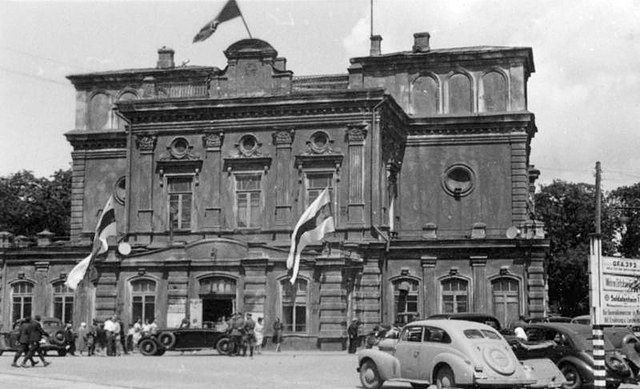Byelorussian collaboration with Nazi Germany
During World War II, some Belarusians collaborated with the invading Axis powers. Until the beginning of Operation Barbarossa in 1941, the territory of Belarus was under control of the Soviet Union, as the Byelorussian Soviet Socialist Republic. However, memories of Soviet repressions in Belarus and collectivization, as well as of the polonization and discrimination against Belarusians under the Second Polish Republic were still fresh.
Belarusian Central Council, a pro-Nazi semi-government of Belarus operating from Minsk 22 January 1944.
Headquarters of the Belarusian Central Rada June 1943.
Minsk training base in 1942, leaders of the Schutzmannschaft Battalions 102 and 115, as well as the Battalion 118 ready for service in Reichskommissariat Ostland
German-collaborationist Biełaruskaja Krajovaja Abarona, Minsk, June 1944.
Belarus, officially the Republic of Belarus, is a landlocked country in Eastern Europe. It is bordered by Russia to the east and northeast, Ukraine to the south, Poland to the west, and Lithuania and Latvia to the northwest. Covering an area of 207,600 square kilometres (80,200 sq mi) and with a population of 9.1 million, Belarus is the 13th-largest and the 20th-most populous country in Europe. The country has a hemiboreal climate and is administratively divided into six regions. Minsk is the capital and largest city; it is administered separately as a city with special status.
Stamp with the Cross of St. Euphrosyne by Lazar Bohsha from 1992
Napoleon's Grande Armée retreating after his invasion of Russia and crossing the Berezina river (near Barysaw, Belarus)
The first government ("activists") of the Belarussian People's Republic (BNR, Беларуская Народная Рэспубліка), 1918. Sitting, left to right: Aliaksandar Burbis, Jan Sierada, Jazep Varonka, Vasil Zacharka. Standing, left to right: Arkadź Smolič, Pyotra Krecheuski, Kastuś Jezavitaŭ, Anton Ausianik, Liavon Zayats.
Meeting in the Kurapaty woods, 1989, where between 1937 and 1941 from 30,000 to 250,000 people, including Belarusian intelligentsia members, were murdered by the NKVD during the Great Purge








